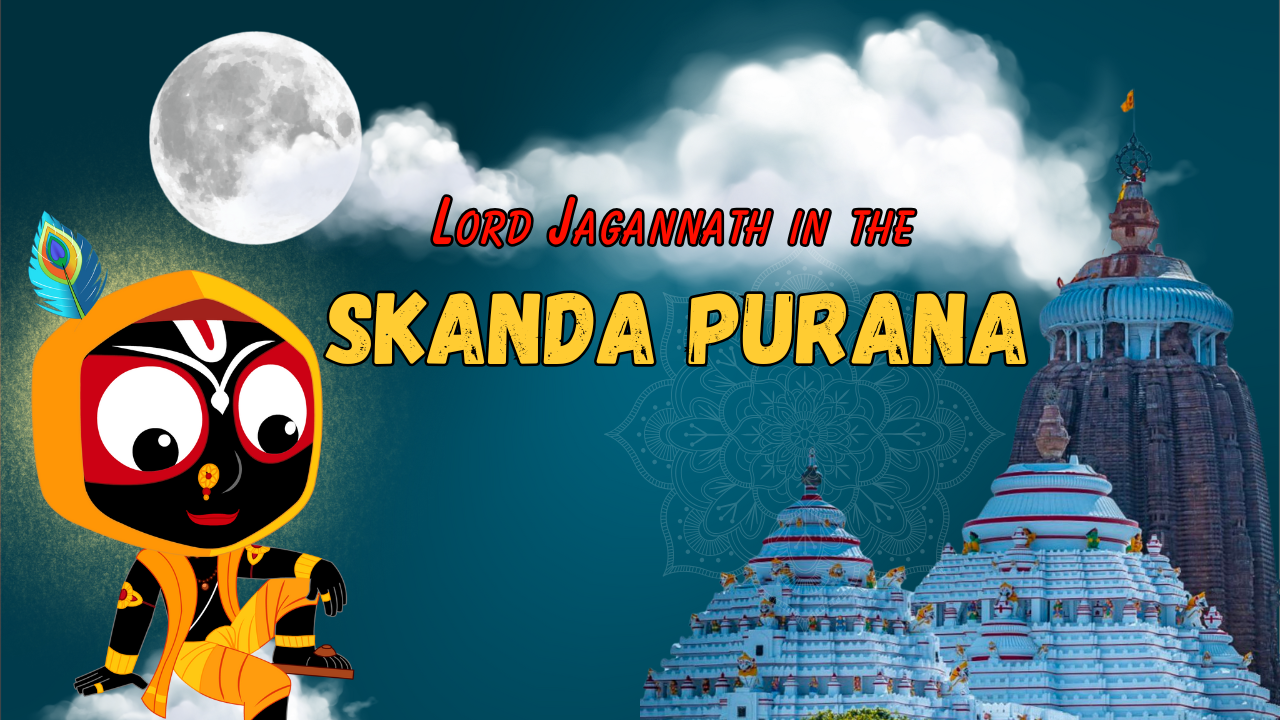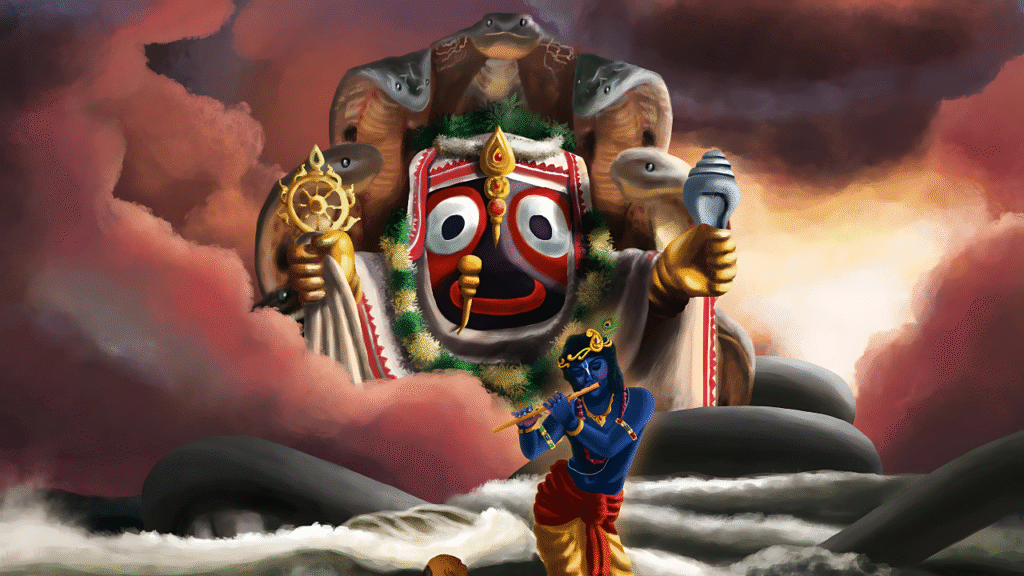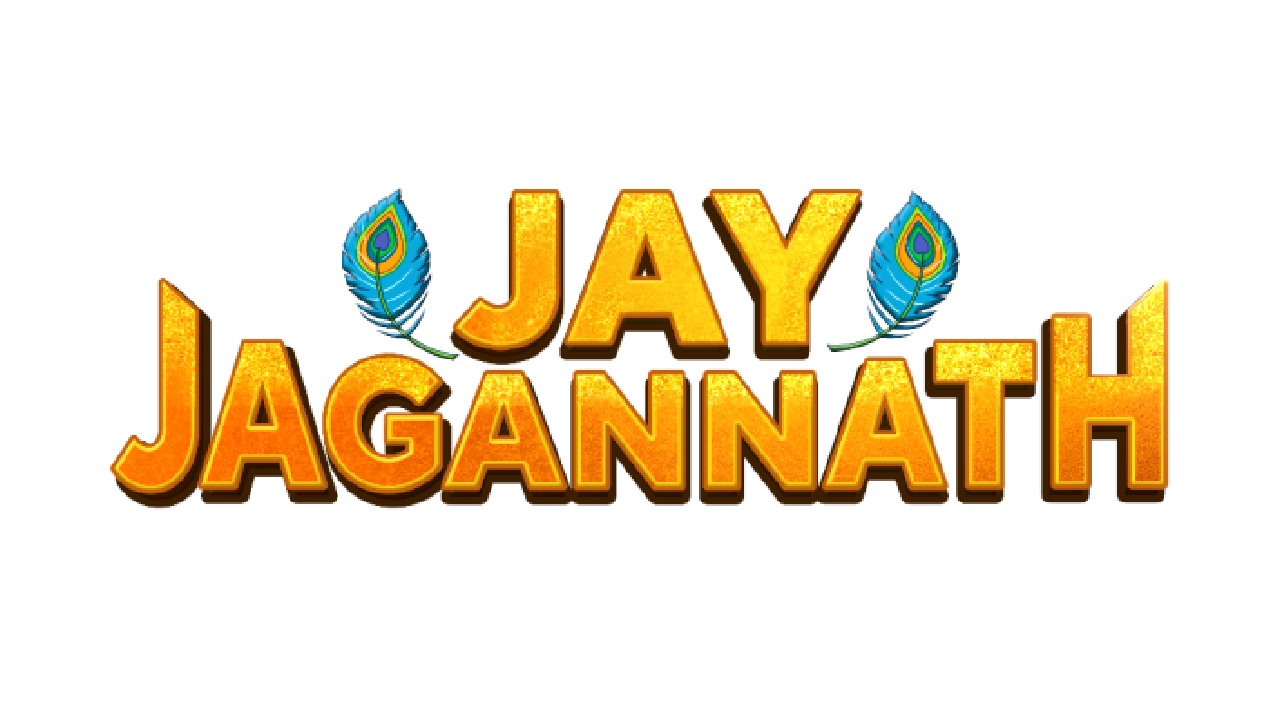
Lord Jagannath in Skanda Purana: The Puranic Origin of the Lord of the Universe
Lord Jagannath in Skanda Purana, the beloved deity of Puri, is one of the most unique and universal forms of Lord Vishnu. His name means “Lord of the Universe”, showing that He belongs to everyone, beyond caste, creed, or boundary. The story of His divine appearance is beautifully described in the Skanda Purana, one of the greatest texts of Hinduism.
Lord Jagannath in Skanda Purana
The Skanda Purana, the largest of all Puranas, contains a special section called Purushottama Mahatmya. This section glorifies the sacred land of Nilachala (modern-day Puri) and narrates how Lord Jagannath came to be worshipped there.
The Purana says that in every age (yuga), Lord Vishnu takes new forms to protect and guide the world. For Kali Yuga, He chose to appear in a wooden form at Nilachala as Lord Jagannath, along with His brother Balabhadra and sister Subhadra.
The Story of King Indradyumna
The tale begins with King Indradyumna, a pious ruler and devoted worshipper of Lord Vishnu. His heart longed to witness the Lord in a rare and eternal form. Through deep meditation, the king received a divine command:
- The Lord would manifest at Nilachala.
- The king must build a grand temple and patiently wait for His appearance.
Obeying this, Indradyumna constructed a magnificent temple at Puri and performed penances, waiting for the Lord’s revelation.

The Miracle of the Wooden Form
One day, a sacred log of wood appeared on the shores of Puri. It glowed with divine light, for Lord Vishnu Himself had entered into it.
The king called Lord Vishwakarma, the celestial craftsman, to carve the idols. Vishwakarma agreed, but with one condition: he would carve in complete secrecy. No one was to open the door until the work was done.
Days passed, but the king’s impatience grew. He opened the door before time—and saw something extraordinary:
- The idols of Jagannath, Balabhadra, and Subhadra stood there, unfinished yet radiating divine brilliance.
- Their arms and legs seemed incomplete, but their forms filled the room with divine energy.
At that moment, a celestial voice proclaimed:
“These are My forms. Worship Me as I am, for I choose to remain in this way.”
Thus, the unique and eternal form of Lord Jagannath was established forever.
Nilachala – The Holy Land
The Skanda Purana praises Nilachala (Puri) as one of the holiest places on earth. It declares:
- Simply remembering Nilachala purifies one’s soul.
- Bathing in the sea (Mahodadhi) near Puri removes sins.
- Worshipping Lord Jagannath grants moksha (liberation).
This is why Puri became one of the Char Dham pilgrimage sites of India, along with Badrinath, Dwarka, and Rameswaram.
The Meaning of Jagannath’s Form
Jagannath’s unique form holds deep spiritual symbolism:
- His large, round eyes show His ever-watchful care over the entire universe.
- His unfinished arms signify that His embrace is limitless—He accepts all beings.
- His form without defined hands and legs teaches that God cannot be restricted by human imagination or artistic shape.
The Skanda Purana reveals that Jagannath is the Lord of all beings, guiding humanity in Kali Yuga with compassion and love.
While the Skanda Purana offers the most detailed story, other Puranas also mention Lord Jagannath:
- Padma Purana calls Him Purushottama, the Supreme Being who grants liberation.
- Brahma Purana glorifies Puri as a place where Vishnu eternally resides.
- Narada Purana describes His Rath Yatra, where the Lord comes out to bless all devotees.
This shows that Jagannath is not just regional, but a truly universal deity.
Verses from the Skanda Purana
Here are two powerful shlokas (verses) with simple meanings:
“नीलाचले जगन्नाथः साक्षाद् देवः जनार्दनः ।
दर्शनात् तस्य ये नित्यं मोक्षं यान्ति न संशयः ॥”
Meaning: “On Nilachala hill, Lord Jagannath is Lord Vishnu Himself. Whoever sees Him with devotion will surely attain liberation.”
“यत्र जगन्नाथो देवः नीलाचले तिष्ठति सदा ।
पुण्य–क्षेत्रम् इदं प्रोक्तं सर्व–पाप–प्रणाशनम् ॥”
Meaning: “Where Lord Jagannath resides eternally on Nilachala, that land is called a holy place. It destroys all sins of devotees.”
Connection with the Rath Yatra
The famous Rath Yatra of Puri is also rooted in Puranic tradition. The Skanda Purana says that once a year, Jagannath, Balabhadra, and Subhadra come out of their temple and travel on grand chariots to Gundicha Temple. This symbolizes that God does not stay hidden but comes out to bless everyone, whether rich or poor, high or low.
It is a living reminder of the Purana’s message: Jagannath is the Lord of All.
Why the Story Still Matters
The Puranic story of Jagannath is not just history—it carries timeless lessons:
- Devotion is rewarded – like King Indradyumna, sincere prayers always reach the Lord.
- God is beyond form – Jagannath’s incomplete idol shows that the Divine cannot be limited.
- God belongs to everyone – His Rath Yatra proves that all are equal before Him.
The Eternal Presence of Jagannath
The Skanda Purana shows us that Jagannath is not only the Lord of Puri, but truly the Lord of the Universe. His story is about God’s eternal promise—to stay with humanity in every age.
At Nilachala, He appeared as Jagannath, smiling and compassionate, to show that love and devotion are greater than rituals or appearances. Even today, when millions visit Puri for His darshan, they experience the living presence of the legend described in the Skanda Purana.


Leave a reply here
Your email address will not be published. Required fields are marked *